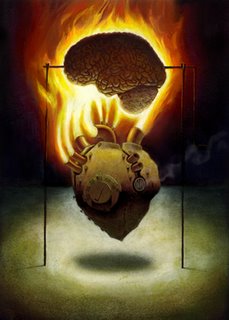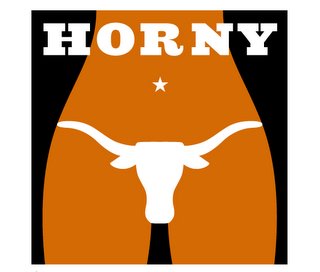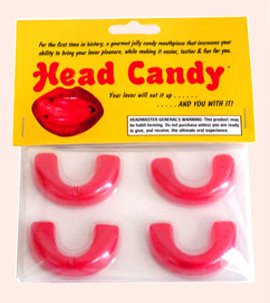Monogamania 2: In a Chemical World...Or, Where Did the Lust Go?
 So, time to finally post the follow up to the, as Anastasia put it, "rip-roaring discussion" on monogamy and polyamory that started this Friday.
So, time to finally post the follow up to the, as Anastasia put it, "rip-roaring discussion" on monogamy and polyamory that started this Friday.Since I last wrote that post, I've been reading a lot of articles about chemical and neurological reactions related to love, lust, and sex in humans. I thought perhaps science could explain the wide variance on views on single- or multiple-partner sexuality. Did it? Yes and no. As usual, every answer brings up more questions and more things to ponder. While the facts remained relatively similar across different articles, every journalist's interpretation of the facts seemed to differ a bit, skewing the results to support either monogomous or non-monogamous theories. There are billions of articles on the topic, but I'll post and sum up a few key ones that I thought were most useful here.
First, a shorter one, "The Chemistry of Love" from the site How Stuff Works. (Note you have to click through to read the whole article). According to this article:
- During the initial romantic infatuation stage (let's call it the "lust" stage), the brain is primarily secreting dopamine, norepinephrine and phenylethylamine--chemicals that induce feelings of bliss, excitement, racing heart, sleeplessness, craving--all those things you feel when you're madly attracted to someone. At this time the parts of your brain with dopamine receptors are stimulated at an increased rate. (In most of the articles I read, these chemical responses are likened to cocaine.)
- During the phase where romantic love kicks in and sex is occurring, different chemicals begin to kick in. These are bonding-influencing chemicals like oxytocin and vasopressin, and are released during orgasm and focus your instinct on being with one particular person (in the prairie vole example explained later, they say these chemicals create a "scent imprint" that makes them recognize and stay with their partners--it's implied we probably do something similar).
- Interestingly, when oxytocin and vasopressin begin to be released, they actually INTERFERE with your dopamine and norepinephrine pathways--therefore building a stronger bond response (comfortable love) than a continual romantic love "rush" response.
- At this stage, endorphins show up (both during sex and during physical contact), making you feel all nice and warm and safe. People can become dependent on this.
- After about 2 to 3 years all of your "lust" chemicals fade out and all the "romantic bonding" chemicals continue to be released, assuming the couple is still having sex. But this is the stage where people "wake up" and realize their partner may not be as constantly enthralling as the "lust" chemicals made them think. The person him/herself hasn't changed, the chemicals that affect your drive toward them have changed.
- There's a monogamous mammal called the prairie vole. It's believed these mammals mate for life because they have oxytocin and vasopressin receptors. Other types of voles don't have these receptors, and are polyamorous.
Here's another article: "I Get a Kick Out of You," in The Economist online. Highlights:
- More info on the prairie vole studies, with further explanation of a distinctive feature of both vasopressin and oxytocin--"they are involved in parts of the brain that help to pick out the salient features used to identify individuals." In other words, if you don't have any of these chemicals, you can't differentiate between people. And again, how do prairie voles use these chemicals to identify other voles, and particularly their mates? Smell.
- It's also environmental: "...animalspeople includedlearn from their sexual and social experiences...Researchers think humans develop a love map as they grow upa blueprint that contains the many things that they have learnt are attractive. This inner scorecard is something that people use to rate the suitability of mates. Yet the idea that humans are actually born with a particular type of soul mate wired into their desires is wrong. Research on the choices of partner made by identical twins suggests that the development of love maps takes time, and has a strong random component."
- They define love as having three distinct stages, lust, romantic love, and attachment: "Lust gets us on the hunt for potential mates, and romantic love narrows our focus and energy to just one person, while attachment encourages us to stick with this partner long enough to raise children."
- Dopamine and norepinephrine, the "lust" chemicals do begin to fade over the course of a romantic love and attachment phases, as the "cuddle chemicals" vasopressin and oxytocin take hold.
- But wait! Dopamine and norepinephrine levels can be resurrected! According to the article, the level of these chemicals surges every time we're confronted with the unknown. So that means...inject new adventures into the relationship, and lust can rises again.
- They imply things as simple to attain as humor and sex can raise your dopamine levels. Even more dopamine inducing: separation (you want it but you can't have it), and fights. And overall, the key is to seek out "novel and stimulating experiences" to share together.
- A glitch: a couple's sense of "novel and stimulating" has to match, or this doesn't work. "People normally differ in the degree to which they seek stimulation. But the most enduring couples, it turns out, are those whose natural levels of sensation seeking, whether high, low or in between, are very closely aligned."
- The best combination for lasting bliss is apparently two low sensation seekers. Two high sensation seekers are okay but may be too interested in variety to ensure a lasting union. "Still, the worst combination is high-low, because they just don't understand each other's interests." (See the article for a definition of what high and low sensation seekers are like.)
- Another glitch: A lower sensation seeker might seem higher than he/she is when he/she is experiencing the adrenaline rush of the lust stage. "It's when the sex becomes routine that problems occur. Initially there can be a great attraction between a high [-level] and a low [-level]. And only later may they realize how fundamentally different they are."
- New topic: SMELL. You've got one. No one else has got yours. Everyone's got their own smell, based on their immune system makeup. So no matter how good someone might look on paper, if they don't smell good to you, you're not gonna be able to bond romantically to them, and vice versa.
- REALLY interesting: According to this, the birth control pill can make women choose the wrong scented person. Because the pill simulates pregancy, the woman's olfactory system looks for a protective scent, and often goes for a man who has a "father" or "brother" scent. "A few years into marriage, a woman may stop using birth control only to find herself less interested in her mate without knowing why."
Does all this mean monogamously-oriented people are perhaps just less sensitive to dopamine and the "lust" chemicals and more sensitive to the "romantic love chemicals?" If sex and humor add novelty to a relationship in ways that can boost dopamine, why do long-term couples stop having sex? If we made sure we had sex regularly--EXCITING sex--would we lust after each other forever? (Man, do I want this one to be true.)
And can a reasonably high-sensation girl ever get a friggin' boyfriend that doesn't eventually bore her to death (not that I need to know this one *personally* or anything...look up...whistle...don't be obvious...)?
Please let me know what you think.
Whew. I'm spent. Someone gimme a dopamine injection.













